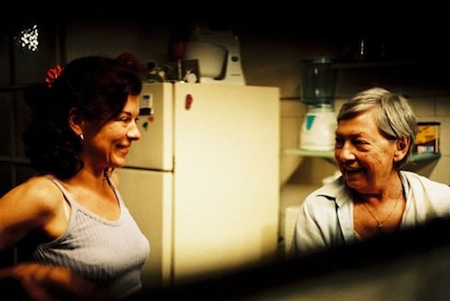Closing night of the San Sebastian Film Festival, and I’m tracking the ever-itinerant Brazilian born co-founder of FiGa Films, which has become a key force in Latin American cinema’s presence on the international stage. Sandro Fiorin is clearly excited: jetting off to Paris for more meetings, and celebrating FiGa’s most recent acquisition, Carne de Perro, winner of the New Directors prize, the festival’s most compelling competitive section. This raw, oblique portrait of a solitary man suffering the unspoken crimes of his past is evidence of the type of risk-taking cinema that FiGa is keen to discover and promote, as well as proof of a robust Chilean scene (count Pablo Larrain’s No, picked up by Sony Classics, a major score).
Fiorin is modest about his accomplishments but his vision continues to reveal a prescient streak. FiGa wisely gambled on the unclassifiably auteurist work of Portuguese Miguel Gomes, with his langorous, reflexive band-on-the-run road movie musical, Our Beloved Month of August, a hindsight masterwork that paved the way—for audiences at least—for his transcendent post-colonial melodrama Tabu, among the prestigious New York Film Festival‘s more radical selections. [Our Beloved Month of August is now distributed by The Cinema Guild.]
Thus one could draw a map, from Basque country to New York, São Paulo to Lisbon, Santiago to LA (FiGa’s home), charting the amicable but uncompromising legacy of Fiorin and FiGa, an imprimatur that turns heads for those willing to watch the margins, moving our way.
Keyframe: FiGa is dedicated to films that—to quote your mission statement—transform you, blow you away. The San Sebastian film festival (you sat on the Horizontes Latinos jury) has just wrapped, and the award winner for New Directors deservedly went to Carne de Perro, a Chilean film about a man still haunted by the Pinochet years in starkly uncertain ways. Clearly this film embodies the FiGa ethos. Can you talk about your affinity for the film and your excitement about its future? And can you elaborate on the FiGa way, how you got started, where you’re headed?
Sandro Fiorin: About our beginning: it has everything to do with the San Sebastian Film Festival. It is where we started seven years ago. It’s where we acquired our first film ever, Alice’s House. It was the first festival that opened its doors to us and welcomed Alex and I. The festival has deep significance for us as it’s the only A festival with a strong Latin American connection. Quite possibly, it’s the best festival for us in every level, especially because of Cine en Construccion, where we have found most of our titles (also in Toulouse).
We have been tracking Carne de Perro for a long time. The producer, Adrian Solar, is one of the best in the business, we always wanted to work with him. The director, Fernando Guzzoni, went to Cannes Residence/Cinefondation to develop the project, and that is pretty hard to get in to. After watching some footage back in January, we knew this was going to be a great challenging film and we had to have it. It’s hard to predict the future of this particular film. Since the beginning we knew it would be well received by the critics, but also felt that the audience (even in festivals) could get turned off by some graphic moments and overall political subject. It was a total surprise that it won Best Film right off the bat, it helps a lot. I’m sure it will receive more invitations because of this; it opens a lot of doors. We are very fortunate, since our beginning.
Keyframe: This brings up the question of the criadera, the nursery; of nurturing new talent and taking risks on younger directors, often to see their careers bloom. Can you take credit for some of these career trajectories?! We’ve seen Nicolas Perreda, Miguel Gomes and others really mature, and you’ve been there early on the scene, vigilant of groundbreaking, powerful work.
Fiorin: No, we can’t take any credit for the filmmaker’s career, that is totally up to them. What we can and have always done is guide them in the right direction, if they want it. We can’t force anyone to become successful, whatever that means in our ‘indie/foreign universe.’ Nicolas and Miguel were destined to be recognized by their talents.
We try as much as possible to be in the right places. Small festivals and co-production forums that are off the radar are fertile ground to ‘discover’ new, exciting talent. What we can take credit for is this: we travel like crazy, throughout the year, searching, asking friends, watching shorts, digging. As we say in Brazil: ‘quem procura, acha’ (those who search, find).
Keyframe: Which brings me to Miguel Gomes, whose Our Beloved Month of August, on your roster, became something of a cult hit, and anticipated his ‘breakout’ Tabu, which is now playing at the NYFF. How does it feel to nurture new talent, only to see it ascend, potentially out of your reach?
Fiorin: This is a good one. We knew about Tabu way back. We also knew it wouldn’t end up in our hands. It’s a Portuguese co production with Germany and Brazil—too many bosses. Though we’d be delighted to handle it, it was better this way. When we watched the film in Berlin, big world premiere, it brought tears to my eyes. We were a little sad, but also so lucky to have met Miguel and Luis (his producer) when they were virtually unknowns. To be part of their history and witness their success was very moving and rewarding.
This is part of the business; it will continue to happen and quite honestly we can’t think about it in terms of pure loyalty. This is a business, as small and difficult as it is, and these are the rules. The flip side of it is that now we are showered with choices, projects from a lot of people we respect, so it all evens out in the end. I’m sure we’ll continue our relationship with O som e a furia (Miguel’s production company). As matter of fact we benefited a lot from the success of Tabu. We partnered with Cinema Guild for the DVD release of August, they’re doing a beautiful package, with lots of rare extras. Plus, the other filmmakers part of OSEAF are incredibly exciting and talented, we can’t wait to work with some of them.
Keyframe: Can you talk about the health of Latin Cinema? As it relates to particular national cinemas? There’s a tendency to celebrate Latin cinema while also ignoring its diversity, perhaps due to certain trends perpetuated by press and audience alike. Is FiGa therefore mercenary by nature, both a primer to and corrective of Latin cinema?
Fiorin: Latin American cinema is very healthy. Most of the continent is booming economically, more funds are being created, the number of productions growing every year, etc. However, it doesn’t mean it is any better. What is good about all this is that we have a lot more choices, other companies are also working with the region, and more festivals are embracing the cinema coming from Mexico to Argentina. Our main concern at the moment is the industry in Portugal and Spain, which are just as important to us, directly related to Latin America, and the best and most obvious co producer partners.
I guess we could be called mercenaries, since we devour this particular cinema ad nauseam. Not sure about the corrective part, though. We can’t shape anything, we just try to follow our instinct and stay away from obvious trends and what’s considered easy to sell. If there’s one thing we are not it’s accommodating and inclined to follow others. This is the main reason we got into this business, to reinvent our roles as world sales agents, to create new ways of distribution, searching tirelessly for what we consider new and original.
Keyframe: And you’ve moved beyond Latin Cinema, recently acquiring Denis Cote’s splendid Bestiaire. [U.S. distribution of this film lies with kimstim.] What can we expect in the future from Figa? Is it possible that Latin films will be subsumed into the film culture at large, thus obviating the distinction? And for each success on the grand stage, for Larrain, Alonso, etc., (examplars of the Latin beat), it seems you have a small film waiting in the wings, ready to change the cinema landscape. Any forecasts you care to share?
Fiorin: We were starting to get bored with people’s expectations from us. One day, a woman sitting next to me in the cinema said, right after she saw our logo before the film started, ‘Oh, it’s a FiGa film, it must be a weird thing from Paraguay’ (or something to that effect). She had no idea who I was, by the way. From that moment on I talked to Alex and we decided we needed to continue surprising the audience that knows us. We will continue focusing on the same type of filmmaking we believe, but let’s no longer be trapped by a region. Lo and behold, our friend Denis Côté was looking for a partner in crime and we jumped in.
Before that, we had already worked with American, Spanish and Portuguese productions, but Bestiaire was the first film that got people confused about us, which we liked a lot. Now we have our first African film, Yema, which was in Venice recently. Next we’ll have something from Asia, probably Malaysia or the Philippines. So it’s no longer where the film is from, but the type of film it is (which I can’t classify). It’s everything and nothing we’ve seen before, familiar and foreign at the same time. I guess it will continue to be ‘weird’ in a way.
I believe LatAm cinema is already part of the mainstream. There are big popular productions, the audience is more used to it, we see more and more recognizable names, people care for them, the films are being very much accepted in far flung places, more than ever. It’s not obviating its distinction, there will always be Hollywood and the rest. LatAm is now part of the European and Asian club, same level of quality and, sometimes, lack of it.
We’ll continue to search high and low for new projects, in places where there’s almost no production at all. With easy to handle technology, the Internet available almost everywhere, we can’t wait to see what can come from a remote corner of the planet, how these kids will continue to reinvent storytelling, how challenging it will continue to be for us to stay relevant.






